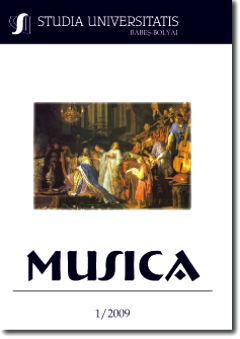GYÖRGY LIGETI’S SECOND STRING QUARTET: BIOGRAPHICAL INFLUENCES AND NEW TECHNIQUES
Keywords:
Ligeti, quartet, strings, micropolyphony, biographicalAbstract
Despite György Ligeti’s personal denial of the direct influences on his music by the events from his young years, the listener can easily find traces and echoes of traumatizing experiences in many of his compositions. The study attempts to answer the following question: to what extent is Ligeti’s music tributary to the composer’s unfortunate youth?
The study emphasizes a few critical biographical details, as well as several related musical consequences. After having had quite a happy childhood in his native town of Târnăveni (Transylvania), and relative stable and fruitful teen years in Cluj, Ligeti faced a horrible personal and professional tragedy when The Second World War broke out. Many of his dreams were shattered, and by the end of the conflagration he would lose two members of his family. The circumstances of these occurrences had been horrifying with Ligeti himself surviving the ordeals by pure chance. Many years later, he would testify that during the Nazi occupation “life and death became a matter of relative indifference.” After the war, Ligeti had to endure yet another terrifying reality: the early years of communism in Hungary, the soviet oppression, and the humiliating cultural censorship. Memories of all these years would haunt the composer throughout his entire musical career.
In attempting to solve the question, particular interest is taken in Ligeti’s Second String Quartet. It is a mature composition, a synthesis (although Ligeti disliked the word) of earlier Bartók-Kodály influences, features borrowed from Stravinsky and Berg, micropolyphony from previous works, and the cooled expressionism of late 1960s.
References
*** Ligeti, György, in: The Concise Oxford Dictionary of Music, eds. Michael Kennedy, Joyce Bourne, and Percy Alfred Scholes, Oxford University Press, New York, 1996, 423.
*** Ligeti, György (Sándor), in: Baker's Dictionary of Music, eds. Nicolas Slonimsky and Richard Kassell, Schirmer Books, New York; Prentice Hall International, London, 1997, 545–6.
*** Ligeti (György), in: Larousse Dicţionar de mari muzicieni, rom. (Larousse Dictionary of Great Musicians), eds. Antoine Goléa and Marc Vignal, Translated by Şerban-Părău Oltea, Univers enciclopedic, Bucharest, 2000, 276–7.
Cobbers, Arnt. Legitimiert. Interview with György Ligeti, in: Crescendo, 4/2002. Available online at:
http://www.schott-cms.com/nocache/gyl/symposium/#ligetim. Accessed 27 September 2004.
Dibelius, Ulrich, Ligeti, György (Sándor), in: Die Musik in Geschichte und Gegenwart: allgemeine Enzyklopädie der Musik, eds. Friedrich Blume and Ludwig Finscher, 108–21. Kassel and New York: Bärenreiter, 1998.
Griffiths, Paul, Ligeti, György (Sándor), in: The New Grove Dictionary of Music and Musicians, eds. Stanley Sadie and John Tyrrell, 690–6. New York: Grove's Dictionaries, 2001.
[Ligeti, György]. György Ligeti in Conversation with Péter Várnai, Josef Häusler, Claude Samuel and Himself. Translated by Gabor J. Schabert, Sarah E. Soulsby, Terence Kilmartin, and Geoffrey Skelton, London, Eulenburg Books, 1983.
Ligeti, György, Atmosphères, für grosses Orchester ohne Schlagzeug, Universal Edition, Wien, 1971.
Ligeti, György, Streichquartett No. 2, Schott Music, Mainz and New York, 1971.
Ligeti, György, String Quartets and Duets. Arditti Quartet, Sony Classical, New York, 1997. Compact disc.
Lobanova, Marina, György Ligeti: Style, Ideas, Poetics, Translated by Marc Shuttleworth, Verlag Ernst Kuhn, Berlin, 2002.
Richart, Robert W., György Ligeti, a Bio-Bibliography, Greenwood Press, New York, 1990.
Toop, Richard, György Ligeti, Phaidon Press, London, 1999.
Downloads
Published
How to Cite
Issue
Section
License
Copyright (c) 2009 Studia Universitatis Babeș-Bolyai Musica

This work is licensed under a Creative Commons Attribution-NonCommercial-NoDerivatives 4.0 International License.



